The USAID and NREL Quarterly Newsletter
June 2022 Edition
In this edition, learn about the commissioning of the first hydro-solar plant in West Africa, journey through recent in-person events and workshops, share your feedback on Greening the Grid, and more.
Subscribe to receive this newsletter via email.
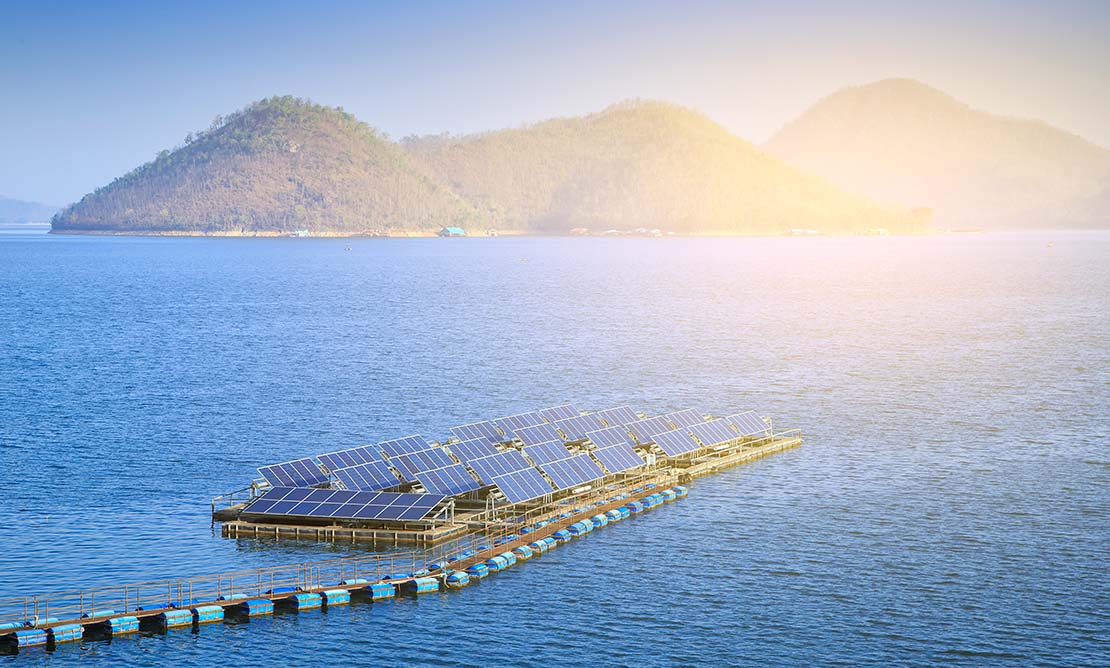
Contents
Supporting Colombia's Clean Energy Transition
Early-Career Energy Sector Leaders From Colombia Visit NREL
Battery Energy Storage Systems Deployment Assistance for Thailand
What's New
Powering Ghana: USAID and NREL Provide Technical Assistance To Develop First Hydro-solar Plant in West Africa
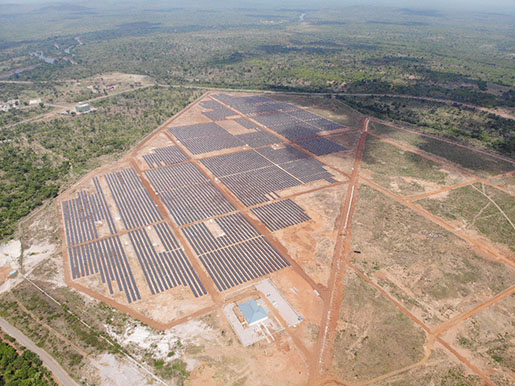
Aerial view of 50-MW solar PV plant, with 200 additional megawatts under development. Photo from BPA
The first West African hydro-solar plant was deployed in Ghana in January 2022, with technical support from USAID and NREL. Once its full capacity is brought online, this hydro-solar plant will put Ghana on track to cut its power sector greenhouse gas emissions by 235,000 tons per year, moving the nation closer to reaching its target emissions goals.
USAID and NREL, through the USAID-NREL Partnership and in collaboration with the West Africa Energy Program, provided technical assistance to the Bui Power Authority (BPA) to install 250 MW of solar photovoltaic (PV) at Ghana's Bui Power generation station, operating in coordination with the existing 400 MW of hydropower. In January 2022, 50 MW were successfully brought online, and the construction of the additional 200 MW is scheduled for completion by late 2022. USAID and NREL conducted technical analysis, suggested design changes, and reviewed grid impact and stability studies, including the introduction of a 20-MWh battery energy storage system with controls so the plant can meet the new Ghana grid codes for variable generation resources.
This new capacity will provide enough energy to power an estimated 200,000 households and allow BPA to gain valuable experience in developing more solar energy projects. Overall, the hydro-solar hybrid installation allows Ghana to harness its immense solar resources, combat low water levels during the dry season, and provide grid operators more flexibility to run the hydropower plant at night.
The solar PV installation with battery storage complements the hydropower production at the Bui Power Plant, ultimately increasing system flexibility and diversifying BPA and Ghana's energy mix.
Read the full program news story on powering Ghana.
Supporting Colombia's Clean Energy Transition
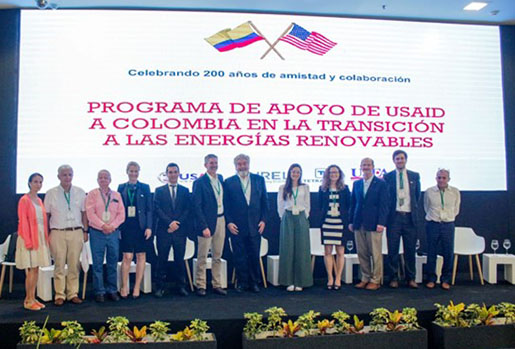
Representatives of the USAID Colombia Project during the Renewable Energy Conference in Barranquilla, Colombia, showcasing the USAID Colombia portfolio of activities for the efficient integration of renewable energy as part of Colombia’s energy transition. Photo from Jasson Carrero, USAID Scaling Up Renewable Energy Program
Michael Ingram and Daniella Rough represented USAID and NREL at the World Energy Council 5th Renewable Energy and Distributed Energy Resources Conference in Barranquilla, Colombia, May 11–13, 2022. The USAID/Colombia mission hosted a side event for over 70 high-level professionals to present the results of the project, including the Colombian Energy Sector Workforce Training Program, providing ongoing support to the government of Colombia on hydrogen, offshore wind, and geothermal technologies; training for indigenous communities in the La Guajira region on energy transitions, with an emphasis on the inclusion of women; plans to rebuild Colombia's Providencia Island; and other areas of support provided from 2018 to 2022. Through presentations from USAID and its implementing partners (NREL, the United States Energy Association, and Tetra Tech) and various stakeholders involved in the project, they shared how technical support, analysis, best practices, and training contribute to the country's renewable energy transition.
Daniella Rough also moderated a panel during the conference that focused on the integration of distributed energy resources in the Colombian power system and included panelists that represented the regulator, grid operator, distribution company, PV installer, and financiers of projects related to distributed energy resources. The panel that Michael Ingram participated in was focused on sustainable communities and the challenges with electrifying them with renewable energy, from social, political, and economic perspectives. Michael also shared the experience from Providencia Island, where the project is supporting the rebuilding of the island with PV and a battery energy storage system.
This conference represents one of the first in-person events in Latin America since the pandemic and included representatives from all over the region. The conference was focused on addressing the challenges of integrating large shares of renewable energy and distributed energy resources in the national energy system and allowed different entities and countries to share success stories and lessons learned.
The challenge that was addressed was one that is experienced globally with increased integration of distributed energy resources such as rooftop solar, battery systems, and electric vehicles. The side event and panels that NREL participated in helped to highlight the ongoing technical assistance that USAID and NREL have provided to support the government of Colombia in its energy transition.
Multiple resources and publications were shared at the conference, including:
A Climatelinks blog publication on Providencia Island's sustainable energy transition following Hurricane Iota
A power system capacity expansion analysis published by NREL that uses Hybrid Optimization of Multiple Energy Resources modeling to detail the costs and benefits of integrating renewable energy and energy storage on Providencia Island's remote power system
A video showcasing Colombia's clean energy transition (view clean energy transition video in Spanish or view clean energy transition video in English)
A video detailing how the Workforce Training Program is accelerating Colombia's clean energy transition (view Workforce Training Program video in Spanish or view Workforce Training Program video in English)
And Colombia's Clean Energy Transition page on the USAID-NREL Partnership website.
USAID and NREL Present at Asia Clean Energy Forum and Share Report About Floating Solar Photovoltaic Deployment in Southeast Asia

June 14–17, 2022, USAID and NREL hosted several virtual events at the 17th Asia Clean Energy Forum, where clean energy experts met to discuss ideas and ongoing efforts to accelerate the low-carbon energy transition in Asia and the Pacific. Speakers from USAID and NREL presented on a range of topics, such as engaging the private sector in the clean energy transition, improving gender equity in the workforce, and deploying floating solar in Southeast Asia.
On June 17, 2022, NREL researchers presented a new report, Enabling Floating Solar Photovoltaic Deployment: Exploring the Operational Benefits of Floating Solar-Hydropower Hybrids. This report, published with USAID-NREL's joint assistance program for Southeast Asia, the Advanced Energy Partnership for Asia, helps address the need to meet growing energy demands while reducing the carbon footprints of power sectors. Through the adoption of hybrid floating solar photovoltaic-hydropower systems, countries can meet demand, leverage existing hydropower projects, and lessen land-use conflicts. This research offers some applications to the Southeast Asian context, but the insights are broadly applicable.
Watch the recordings for three sessions hosted by USAID and NREL:
U.S. Government Support for Private Sector Clean Energy Champions
Enhancing Women's Participation in Southeast Asia's Energy Transition
Floatovoltatics: Scaling Up Deployment of Floating Photovoltaics in Southeast Asia.
Read the full report: Enabling Floating Solar Photovoltaic Deployment: Exploring the Operational Benefits of Floating Solar-Hydropower Hybrids.
Early-Career Energy Sector Leaders From Colombia Visit NREL
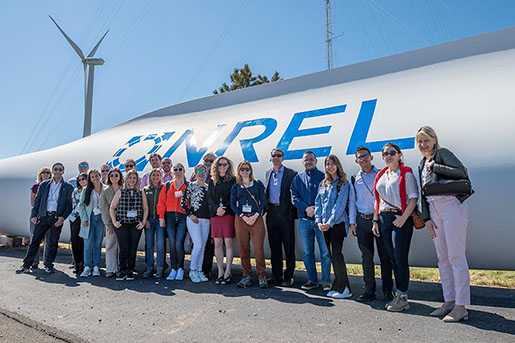
NREL provided a comprehensive tour of its Flatirons Campus to the Colombia delegation. Photo by Joe DelNero, NREL
In May 2022, NREL welcomed a group of early-career energy sector leaders from the Colombia Young Leaders Capacity Building Program. These 10 participants were the highest scoring and most engaged students from a 12-month comprehensive training course designed to ready Colombia's energy sector workforce to participate in the construction, operation, and grid integration of variable renewable energy projects. This effort was jointly led by the USAID/Colombia mission with support from NREL, the United States Energy Association, and Tetra Tech, the implementing partner for USAID's Scaling Up Renewable Energy program.
During its visit, the cohort learned from NREL's experts, toured the facilities, and collaborated for the first time in person after working together virtually for almost 3 years. The visit to NREL's campus not only rewarded the participants for their dedication throughout the course but was also an opportunity to finally meet many of the participants, experts, and coordinators who helped make the course a success. The visit represents a real milestone for the Colombian participants in their career development journey in supporting and developing renewable energy grid integration projects.
Read more about the cohort's visit to NREL's campus and learn more about the work of the USAID-NREL Partnership in Colombia.
Electrifying Transport in Pakistan: USAID and NREL Continue Support for Pakistan's Electric Vehicle Deployment
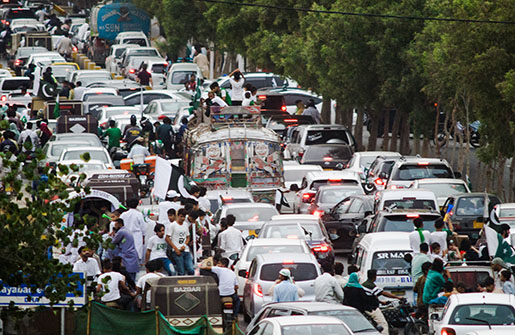
Photo from iStock
Pakistan's National Electric Vehicle (EV) Policy has the goal of electrifying 30% of Pakistan's passenger vehicle and heavy-truck market, and 50% of the two- and three-wheeler market, by 2030. This will lead to a substantial increase in load on the electric grid that, if done without coordination, could strain the grid. Alternatively, EVs could serve as a flexible load or even storage that helps stabilize the grid and make it more reliable and efficient. Their impact will depend on how this new load is managed.
To proactively promote best practices and broaden the dialogue among stakeholders in Pakistan about how to address a rapidly growing EV load, USAID/Pakistan, in partnership with NREL and Pacific Northwest National Laboratory, and in collaboration with the National Electric Power Regulatory Authority of Pakistan, are hosting a series of workshops on EV topics targeted specifically at in-country ministry, regulatory, and private sector partners.
The first workshop of the series was a 2-hour virtual event in March 2022 on the topic of managed charging for EVs. The workshop began with an explanation of EVs, their charging infrastructure, and their relationship with the grid. It discussed charge management strategies and technologies, the state of these technologies, case studies, and recommendations most likely to fit Pakistan's unique market as well as bi-directional charging and the value provided to buildings and the grid. The event saw 100+ highly engaged attendees, nearly all whom were local to Pakistan. Further, 16 of these attendees were female, indicating progress in engaging the women of Pakistan in EV work. USAID and NREL are actively working to increase the opportunities for women in Pakistan to work in renewable energy as many women in the country, even those who are highly educated, struggle to find work. As Pakistan pursues its EV adoption goals, resources such as this and future workshops hosted by the USAID-NREL Partnership will give stakeholders an opportunity to explore complex questions alongside world-class experts, better understand the relevant technologies and policy levers, and ultimately make more informed decisions about how to properly manage the load on the electric grid brought on by scaled-up EVs, without sacrificing grid stability and cost. Watch the event's recording: Electric Vehicle Managed Charging in Pakistan.
This series builds on past USAID-NREL Partnership support for EV deployment in Pakistan. Explore the 2020 technical report examining EV policies relevant to Pakistan: Effectiveness of Electric Vehicle Policies and Implications for Pakistan.
Battery Energy Storage Systems Deployment Assistance for Thailand
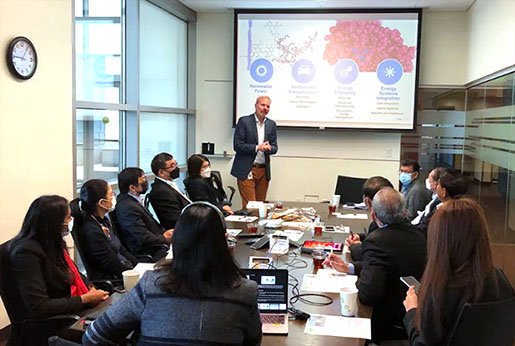
Adam Warren, center director for the Accelerated Deployment and Decision Support Center, presents to visitors from EGAT. Photo by Isabel McCan, NREL
With a goal of improving Thailand's energy reliability and security by bolstering domestic generation of variable renewable energy resources, the Electricity Generating Authority of Thailand (EGAT) is interested in understanding how to best optimize deployment of renewable energy and energy storage. Through USAID and NREL's joint assistance program for Southeast Asia, the Advanced Energy Partnership for Asia, NREL researchers assisted EGAT's efforts by (1) conducting modeling and analysis to investigate the economic feasibility of deploying battery energy storage systems (BESS) at two sites in Thailand and (2) hosting a series of capacity-building trainings with EGAT staff focused on BESS and how they can address a variety of operational challenges on Thailand's power systems.
This comprehensive analysis and the in-depth trainings will help inform EGAT's larger, longer-term plan for capturing the value of BESS and complementary resources, developing new grid codes to ensure safe deployment, and will support a potential future circular economy for these technologies in Thailand. When done successfully, BESS applications can be used as a tool in Thailand to improve power system flexibility, defer transmission upgrades, and meet the country's clean energy objectives. Representatives from EGAT also traveled to NREL in May 2022, as part of their Executive Leadership Training Program focused on clean power generation solutions, where they met with NREL partners in person and toured NREL's state-of-the-art research campus.
The virtual trainings explored topics including BESS deployment best practices, methods, and processes; policy development and planning strategies; grid codes and interconnection procedures; and drivers, barriers, enablers, and market considerations for the reuse and recycling of large-format batteries used for energy storage.
Learn more about NREL's analysis support for Thailand's efforts to develop technical codes and standards to govern the installation and operation of BESS in a 2021 technical report: Key Considerations for Adoption of Technical Codes and Standards for Battery Energy Storage Systems in Thailand.
Power Sector Learning Series Explores the Quality and Safety of Rooftop Solar Photovoltaics in Developing Countries
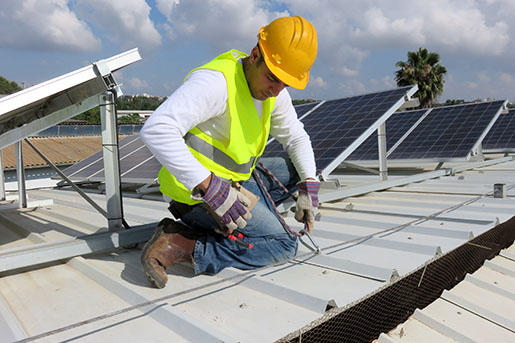
Photo from iStock
USAID's Southeast Asia Enhancing Development and Growth through Energy (EDGE) Hub and NREL host the Asia EDGE Power Sector Learning Series, where global experts come together to share cutting-edge approaches and best practices to enable clean energy markets in Asia. These webinars are free and offer virtual training on power sector planning, resilience, grid integration, and power sector modernizations to professionals all over the world.
On April 18, 2022, the Power Sector Learning Series hosted a webinar on Rooftop Solar PV Quality and Safety in Developing Countries. The webinar discussed this USAID technical report and detailed how quality and safe rooftop solar PV systems are key to building a secure, resilient energy source in South and Southeast Asia. Overcoming challenges such as poor installation practices, overall PV system performance, suboptimal quality of system components, and safety incidents using global industry best practices will contribute to sustainably growing clean energy markets in these regions.
The webinar also covered a case study of India, where researchers found that by assessing India's unique challenges to solar PV quality and safety, they were able to tailor distinctive solutions. This case study highlighted the development of a Solar Vendor Rating Framework for India that will help solar customers evaluate the quality of installers bidding on projects.
Watch the webinar recording on YouTube.
View the technical reports:
Rooftop Solar PV Quality and Safety in Developing Countries—Key Issues and Potential Solutions
Distributed Solar Quality and Safety in India.
View the full list of webinar resources.
View past webinars in the Asia EDGE Power Sector Learning Series.
Lawrence Berkeley National Laboratory and USAID Mexico Providing Technical Assistance To Support Efficient Building Challenge in Mexico City

Oscar Vasquez, Mexico City Ministry of Environment; Michael McNeil, Berkeley Lab; Adriana Lobo, WRI Mexico; Odon de Buen, National Commission for the Efficient Use of Energy; and Luis Gutierrez, National Autonomous University of Mexico. Photo from WRI Mexico
Global direct and indirect greenhouse gas emissions from nonresidential buildings increased by 55% in 2019 in relation to 1990, according to the Intergovernmental Panel on Climate Change.
Mexico City has been part of this trend, as greenhouse gas emissions there doubled from 2016, and electricity from buildings represents almost the totality of indirect emissions from all electricity.
To address the energy and climate impacts of building sector electricity in Mexico City, Lawrence Berkeley National Laboratory is providing technical assistance with support from USAID/Mexico to implement a new phase of the Building Efficiency Challenge, an initiative started in 2020 by the World Resources Institute Mexico (WRI Mexico), the Mexico City Secretariat of the Environment, the National Commission for the Efficient Use of Energy, and the National Autonomous University of Mexico. The kickoff of the second phase of the commercial building retrofit program—held in Mexico City on May 26, 2022, before an audience of more than 70 representatives of government agencies, private sector, academia, and international donor organizations—marked the beginning of recruitment of commercial building operators to participate in the program and provided an opportunity to demonstrate Lawrence Berkeley National Laboratory's technical assistance approach, including an introduction of the Building Efficiency Targeting Tool for Energy Retrofits, also known as "BETTER." At the conclusion of the kickoff event, Lawrence Berkeley National Laboratory held a donor coordination meeting to explain the scope and goals of the broader building efficiency program supported by USAID Mexico and explore potential collaborations.
View the press release issued by WRI Mexico in Spanish.
Improving Cybersecurity in the Power Sector for Utilities Across the Globe
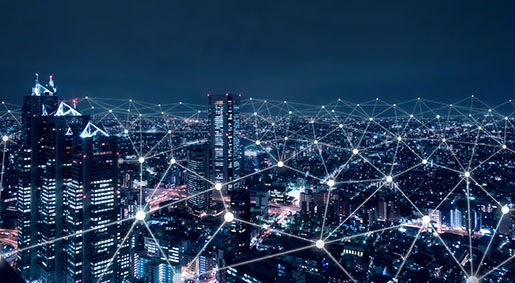
Photo from iStock
Cyberattacks to the power sector can impact utilities everywhere and often come with costly consequences and outages. With the help of utilities and past cybersecurity assessments, USAID and NREL have developed the 11 Power Sector Cybersecurity Building Blocks, designed to help a variety of stakeholders improve security for the electrical grid.
May 10–11, 2022, USAID, NREL, and the Caribbean Electric Utility Services Corp. jointly presented on the topic of grid modernization and the Cybersecurity Building Blocks at the USAID Caribbean Energy Sector Cybersecurity Forum. Additionally, USAID and NREL hosted a virtual booth showcasing information and materials on the Building Blocks, the Resilient Energy Platform, useful resources and reports, and the team's free technical assistance to utilities in need. Representation at the forum also allowed the team to exhibit the ongoing Cybersecurity Building Blocks webinar series, presented in partnership with Deloitte and the Caribbean Electric Utility Services Corp., where cybersecurity experts share knowledge on how utilities can improve security, combat and address cybersecurity challenges, and develop a robust cybersecurity defense program.
View the news story to learn more about USAID and NREL's cybersecurity work in the Caribbean.
Access the slide deck from the Caribbean Energy Sector Cybersecurity Forum: Modernizing and Securing the Grid.
Discover the Power Sector Cybersecurity Building Blocks.
View the Cybersecurity Building Blocks webinar series.
Gain remote consultation and advice at no cost from cybersecurity resilience experts.
Greening the Grid Is Looking for Your Feedback!
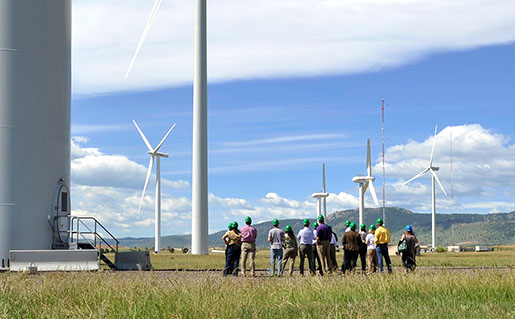
Photo by Dennis Shroeder, NREL
Greening the Grid, a cornerstone of the USAID-NREL Partnership, provides information, tools, and technical assistance to countries looking to transform their power system, modernize their grid, and develop electric mobility. A variety of toolkits—including Grid Integration, Distributed Photovoltaics, Renewable Energy Zones, Electric Vehicles, and Energy Storage—provide users guidance and information in each of these areas. Visitors using Greening the Grid tools can now access the newly launched Feedback Form. The USAID-NREL team will use the information to examine how stakeholders use the toolkit for energy system transformation and grid modernization. Users are encouraged to fill out the form to improve the services offered on the platform.
One of the most useful, crosscutting features of the platform is the Ask an Expert Service. Using this service, power system stakeholders in developing countries can connect with grid integration and transportation experts for high-level guidance and consultation. Greening the Grid's expert network has a deep understanding of the technical, policy, and regulatory issues that surround the integration of variable renewable energy into the grid. These experts are eager to share best practices with government agencies, power system operators, utilities, and regulators looking for advice and consultation.
Provide your valued feedback on the Greening the Grid toolkit so the USAID-NREL team can improve your user experience.
Learn more about Greening the Grid's services and how the entire suite of USAID-NREL Partnership toolkits accelerates the deployment of variable renewable energy around the world.
In-Person Events and Visits Are Back!

Representatives from Tunisia's national utility, The Tunisian Company of Electricity and Gas, with NREL researchers touring NREL's South Table Mountain Campus. Photo by Carishma Gokhale-Welch
Over the past quarter, USAID and NREL teams have been able to participate in a series of in-person visits and events related to their projects.
USAID-NREL researchers Ilya Chernyakhovskiy and David Palchak traveled to India, where they reconnected with stakeholders to gather information for future USAID-sponsored and Children's Investment Fund Foundation-sponsored projects. They traveled to Jaipur, Rajasthan, to meet with the state power procurement agency and discuss opportunities for wind and energy storage that would complement Rajasthan's solar energy policy. Ilya and David also learned about issues facing India's power sector and what areas are a priority for NREL support. Stay updated on Children's Investment Fund Foundation and USAID's work in India.
May 26–27, 2022, NREL hosted five representatives from Tunisia's national utility, the Tunisian Company of Electricity and Gas. The USAID-NREL Partnership is working with the Tunisian Company of Electricity and Gas to support Tunisia's renewable energy transition. The representatives toured NREL energy systems integration capabilities and received an overview of the facilities, tools, specialists, and resources available at NREL to support the increase of variable renewable energy. The USAID-NREL partnership is excited to support Tunisia's clean energy transition.
NREL is proud to host a cohort of interns, sponsored by the Women in Power System Transformation (PST) initiative, on the laboratory's campus this summer! Women in PST is a joint initiative from the USAID-NREL Partnership and the Global Power System Transformation Consortium (G-PST) to address educational and professional barriers to women's representation and leadership in the power sector.
Six graduate students engaged in university-level energy and engineering programs around the country were selected to participate in the Women in PST summer internship program. Women in PST interns were placed at two G-PST technical institutions—three at NREL and three at the Electric Power Research Institute. During an intern's time at NREL or the Electric Power Research Institute, they learn and apply advanced technical skills needed to operate high variable renewable energy power systems and work closely with G-PST researchers and mentors on cutting-edge power systems research and analyses. At the conclusion of their internship, students will be empowered to apply the technical and professional skills gained during the internship to their careers, helping to enable transformational change in the power sector and create the stronger and more diverse clean energy workforce of the future.
"I am excited about the Women in Power System initiative and the avenues it creates for a more equitable, diverse, and innovative power system operations field," said Gayathri Jagadeesh, an NREL Women in PST intern from North Carolina State University.
Learn more about the Women in PST initiative and check out G-PST's work in other areas.
Team Spotlight

Meet Tami Reynolds!
Tell us about your role in the USAID portfolio.
Currently, I lead the cybersecurity efforts within the USAID-NREL Partnership. We have a project with the USAID Bureau for Latin America and the Caribbean where we conduct cybersecurity assessments using the NREL Distributed Energy Resource Cybersecurity Framework tool. Once an assessment has been completed, we provide technical assistance in the key critical areas that need addressing based on the results of the assessment. I also try to build interest in cybersecurity issues throughout the USAID portfolio and help other leads write content and explain the different types of services we could engage in.
What inspired you to work on international projects?
The world is affected by cybersecurity. As energy systems become more advanced, opportunities for cyber events to occur become more common and critical. Knowing that we have tools that can help identify gaps in cybersecurity excites me. We offer solutions so organizations, governments, and utilities don't have to address the problem alone. We can help!
In what ways does your work accelerate the deployment of sustainable, advanced energy systems around the world?
Our team's current focus is ensuring the secure deployment of sustainable, advanced energy systems. By developing new tools and enhancing existing ones, we support this vision at scale. We help achieve this by providing technical assistance and training with our expertise through our USAID collaborative efforts around the world.
Stay Current
Explore all March–June 2022 publications, events, and resources below.
Free Recordings of Previous Trainings
June 2022: ACEF Webinar Recordings
U.S. Government Support for Private Sector Clean Energy Champions
Enhancing Women's Participation in Southeast Asia's Energy Transition
Floatovoltatics: Scaling Up Deployment of Floating Photovoltaics in Southeast Asia
April 2022
Rooftop Solar PV Quality and Safety in Developing Countries
Must Reads
June 2022
Supporting Colombia's Clean Energy Transition
May 2022
After the Storm: Creating a Sustainable Future for Providencia Island Following Hurricane Iota
Providencia Island High-Level Power System Capacity Expansion Analysis
The Building Blocks of Power Sector Security for Utilities Around the Globe
Must Watch
May 2022: Learn how the Workforce Training Program is accelerating Colombia's clean energy transition (view Spanish, view English).
Share


